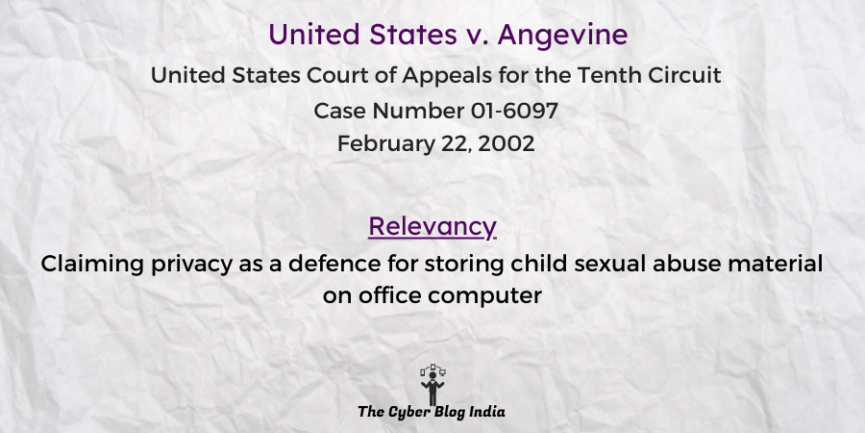United States v. Angevine

United States v. Angevine
281 F.3d 1130
In the United States Court of Appeals for the Tenth Circuit
Case Number 01-6097
Before Senior Circuit Judge Brorby, Circuit Judge Seymour, and Circuit Judge Ebel
Decided on February 22, 2002
Relevancy of the case: Claiming privacy as a defence for storing child sexual abuse material on office computer
Statutes and Provisions Involved
- Certain activities relating to material constituting or containing child pornography, 18 USC § 2252A
Relevant Facts of the Case
- The appellant was a professor at Oklahoma State University. The university had given him an office computer linked with other computers on the university’s network.
- The university’s policy stated that its administrators had the right to access everything on an office laptop, including deleted files. Further, a notification reiterated that computer misuse would attract criminal penalties.
- Disregarding this, the appellant downloaded over 3,000 child sexual abuse material (CSAM) images and deleted them from the office computer after viewing them.
- The police seized his computer, recovering the deleted files using special technology.
- The District Court rejected his motions to suppress the evidence and invalidate the search warrant, sentencing him to prison for fifty-one months. The appellant pled guilty to possession of pornographic material, waiving his right to appeal.
Prominent Argumentappellant’sunsels
- The appellant’s counsel argued that the District Court erroneously rejected his motions and gave a sentence beyond the prescribed limit. Further, the appellant’s Fourth Amendment rights were violated. Lastly, he legitimately expected privacy on his computer.
- The appellee’s counsel submitted that the university policy explicitly stated that they had the right to audit content at any time, always displaying the network banner.
Opinion of the Bench
- The appellant did not have a legitimate expectation of privacy, and his relationship with the office computer was incidental to his employment.
- His Fourth Amendment rights were not violated as it was never intended to protect employees from storing obscene data.
- The District Court correctly denied the suppression motions and calculated his sentence.
Final Decision
- The court affirmed the District Court’s denial to suppress the evidence and dismissed the appeal for sentence calculation based on lack of jurisdiction.
Nikita D’Lima, an undergraduate student at NMIMS School of Law, Navi Mumbai, prepared this case summary during her internship with The Cyber Blog India in May/June 2023.
